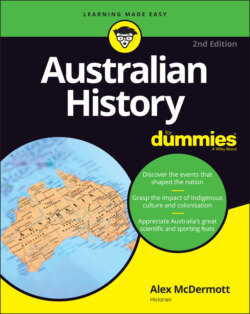Читать книгу Australian History For Dummies - Alex McDermott - Страница 98
A Nation of Second Chances
ОглавлениеIN THIS CHAPTER
Envisioning a new purpose for NSW: Governor Macquarie
Understanding Macquarie’s main areas of reform
Dealing with the consequences of the Macquarie regime
Taking a battering from outside forces
Attempting to fix it all with one Bigge inspector
Returning to England in disgrace but leaving a legacy
Within 20 years of the establishment of NSW as a colony, it had become a place of second chances — a place where people who had made a mess of their lives in Britain could wipe the slate clean and start again. For convicts, this was the reality of the colonial world that they’d been living in almost since 1788 — ever since the first few nightmarish starvation years — but this wasn’t what the Colonial Office, and most of the powerful people in Britain, wanted the colony to be.
The Colonial Office sent out a series of governors (such as Governor Bligh) to try to fix up the mess, but it didn’t end well for any of them — particularly Bligh, who ended up being arrested by the NSW Corps (refer to Chapter 4).
After the Bligh fiasco, the Colonial Office figured they had a troublesome colony on their hands — after all, you don’t arrest the governor unless you’re a rag-tag rebellious lot, right? So the next governor to arrive — Lachlan Macquarie, veteran of the American War of Independence and various skirmishes in India — was told to expect a colony gone wild, full of rapacious profiteers, angry and drunken ex-cons, and a place ripe for rebellion. Macquarie’s instructions were to quickly restore some order.
But something strange happened when Macquarie turned up in NSW in 1810: He liked what he saw. Then, to top it off, he went rogue. Macquarie wasn’t particularly interested in punishing convicts, or in making the place so brutal that it scared Britain’s would-be crims into behaving themselves. He embraced the fact that the colony gave convicts a second chance and made it official policy to reward people who had turned their lives around. If they succeeded and became prosperous, influential or simply useful, Macquarie wanted to know them. This was in complete opposition to what the Colonial Office believed official policy should be.
In the end a stern-faced commissioner was sent out from England to inquire into Macquarie’s rule, and it was found wanting. Macquarie returned to Britain and died a few years later, bitter and unappreciated. But in Australia the mark he left was deep. He ruled New South Wales for 11 years — from 1810 to 1821 — and when they buried him they inscribed his tombstone with the words, ‘Father of Australia’. The colony was already a nation of second chances before Macquarie arrived. But he was the first governor to try to make it official.
In this chapter, I cover the wide-ranging effects of Macarthur’s rule, and the outside forces (and one Commissioner Bigge) that brought him down.
